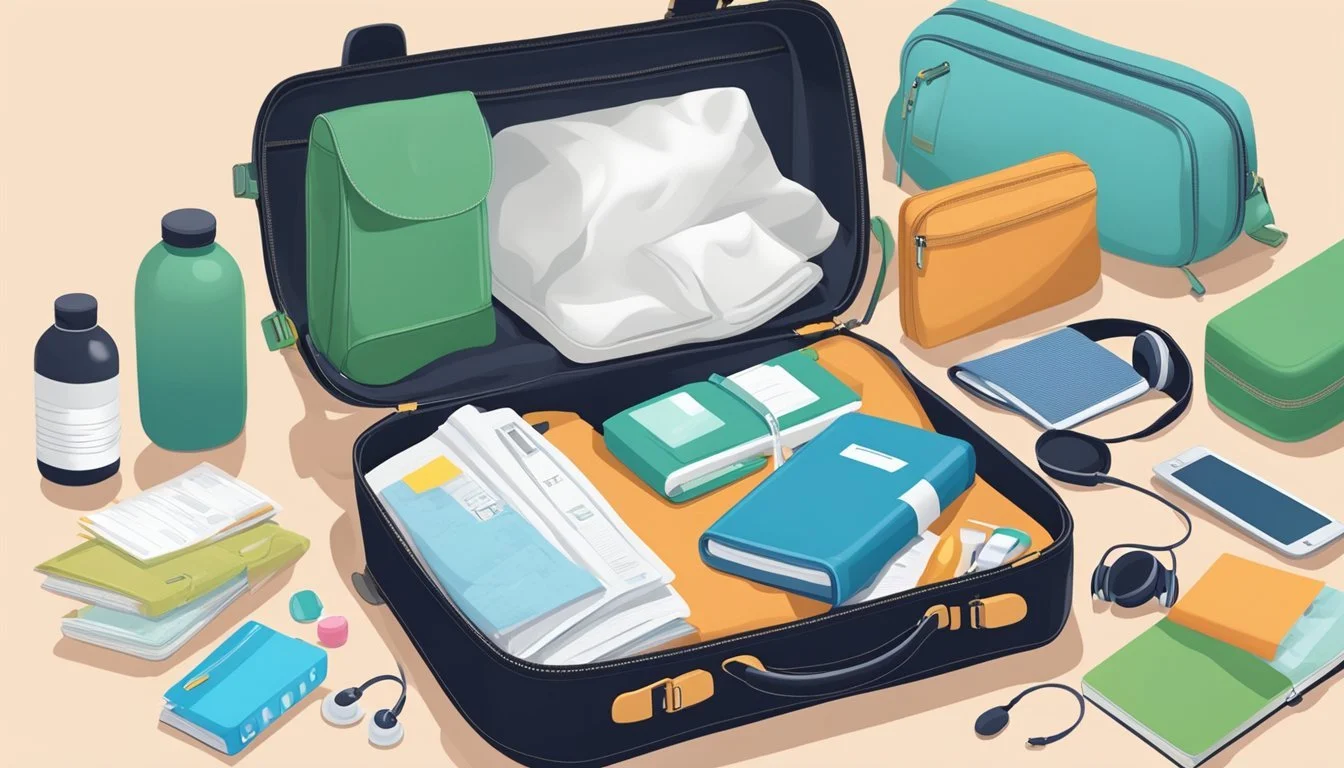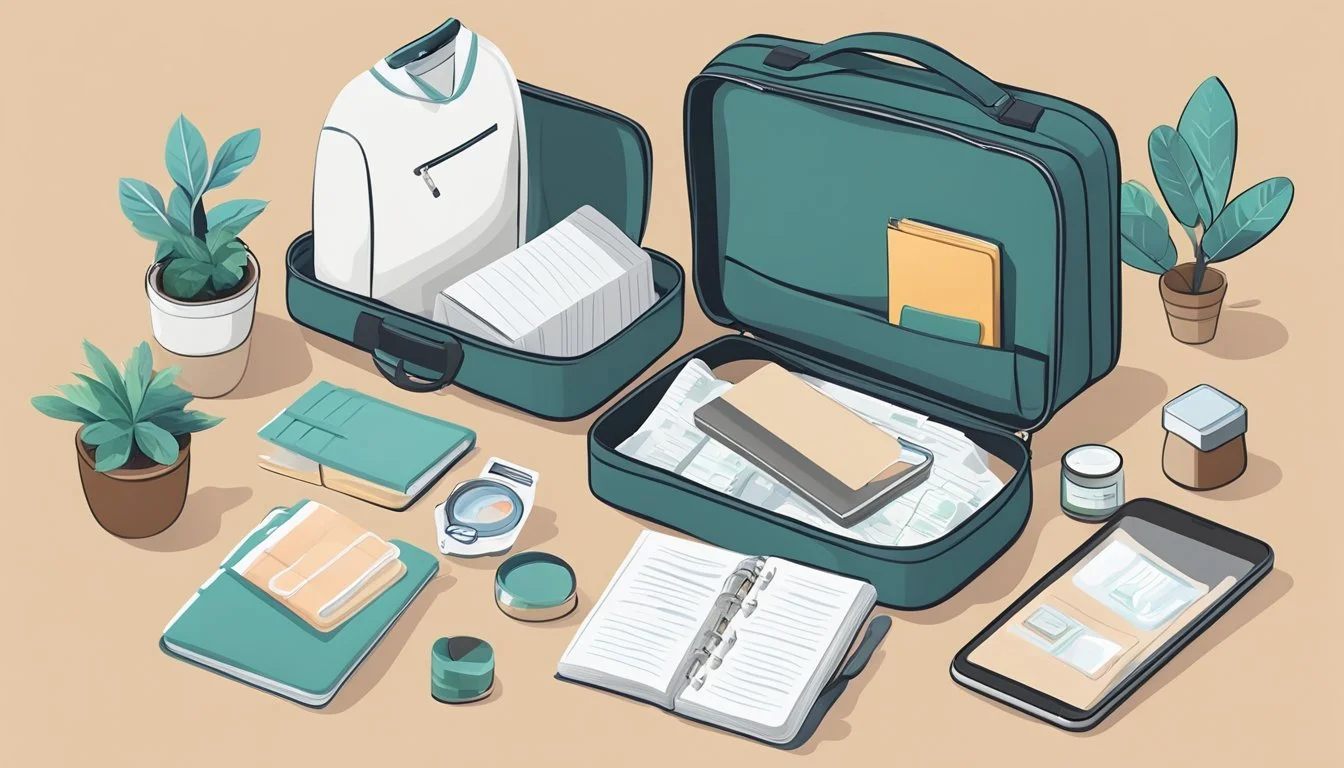7 Tips for Traveling with Bipolar Disorder
Ensuring a Smooth and Enjoyable Trip
Traveling can be an enriching experience, offering opportunities for relaxation, discovery, and personal growth. However, for individuals living with bipolar disorder, the prospect of travel may present unique challenges. The disruption to routine, change in environment, and potential stressors associated with travel can impact mood stability and overall well-being.
With proper planning and self-care strategies, people with bipolar disorder can enjoy fulfilling travel experiences while managing their condition effectively. By implementing tailored approaches and being mindful of their specific needs, those with bipolar disorder can minimize potential risks and maximize the benefits of travel. This article aims to provide practical tips to help individuals with bipolar disorder navigate the complexities of travel while maintaining their mental health.
1) Pack essential medications and documents
Travelers with bipolar disorder should prioritize packing their medications and important documents. It's crucial to bring an ample supply of prescribed medications, ideally enough to last the entire trip plus a few extra days.
Storing medications in their original labeled containers is recommended to avoid issues at security checkpoints. Carrying a copy of the prescription and a doctor's note explaining the medical necessity can be helpful.
It's wise to pack medications in carry-on luggage to prevent loss or delay if checked baggage goes missing. Travelers should also bring contact information for their healthcare providers and a list of current medications and dosages.
Travel insurance documents and emergency contact information are other essential items to include. Keeping digital copies of these documents can provide an extra layer of security.
For international travel, researching medication laws in the destination country is important. Some nations have strict regulations on certain prescription drugs, so advance preparation is key.
2) Create a detailed travel itinerary
Planning a comprehensive travel itinerary is essential for individuals with bipolar disorder. A well-structured schedule can help maintain stability and reduce stress during the trip.
Start by listing all planned activities, including transportation, accommodations, and sightseeing. Include specific times for each event to provide a clear structure for each day.
Allow for flexibility in the schedule to accommodate unexpected changes or mood fluctuations. Build in regular breaks and downtime to prevent overstimulation and fatigue.
Consider scheduling activities that align with normal sleep patterns to maintain circadian rhythms. Plan for medication times and include reminders in the itinerary.
Research local mental health resources and add their contact information to the schedule as a precautionary measure. This can provide peace of mind during the trip.
Share the itinerary with a trusted travel companion or family member staying at home. This ensures someone is aware of the planned activities and can offer support if needed.
3) Inform travel companions about your condition
Letting travel companions know about bipolar disorder can enhance the travel experience and ensure support if needed. It's important to choose trusted individuals to share this information with, such as close friends or family members.
Explaining the basics of bipolar disorder and how it may affect daily activities or mood can help companions understand and respond appropriately. Discussing potential triggers and warning signs allows them to recognize when support might be necessary.
Providing information about medication schedules and any specific needs can ensure companions are prepared to assist if required. It's also beneficial to share emergency contact information and the details of a mental health professional who can be reached during the trip.
Being open about bipolar disorder can lead to a more comfortable and enjoyable travel experience for everyone involved. It allows companions to offer appropriate support and creates an environment of understanding and acceptance.
4) Plan for time zone changes
Time zone changes can significantly impact mood and sleep patterns for individuals with bipolar disorder. Crossing multiple time zones may disrupt circadian rhythms, potentially triggering mood episodes.
To minimize these effects, travelers should gradually adjust their sleep schedule before departure. This can be done by shifting bedtime and wake times by 30 minutes to an hour each day leading up to the trip.
Upon arrival, it's crucial to align with the new time zone quickly. Exposure to natural light during daytime hours can help reset the body's internal clock. Travelers should also maintain regular meal times in the new zone.
Medication schedules may need adjustment when crossing time zones. Consult with a healthcare provider to create a plan for taking medications at appropriate intervals during travel and after arrival.
Consider arriving a day early to allow time for adjustment before any scheduled activities. This buffer can help reduce stress and provide an opportunity to acclimate to the new environment and time zone.
5) Research mental health resources at your destination
Identifying mental health resources at your travel destination is crucial for individuals with bipolar disorder. Before departure, locate nearby mental health clinics, hospitals, or therapists who specialize in bipolar treatment.
Make a list of emergency contact numbers and addresses for these facilities. It's also wise to research local support groups or online communities that cater to travelers with bipolar disorder.
Consider contacting your health insurance provider to understand coverage for mental health services abroad. Some insurance plans may offer telemedicine options, allowing you to consult with your regular healthcare provider remotely.
Familiarize yourself with the local laws and regulations regarding mental health treatment and medication. Some countries have strict rules about bringing certain medications across borders.
If possible, obtain a letter from your doctor explaining your condition and necessary medications. This can be helpful when dealing with customs or in case of an emergency.
6) Maintain a consistent sleep schedule
Sleep plays a crucial role in managing bipolar disorder, especially while traveling. Adhering to a regular sleep routine helps stabilize mood and energy levels.
Set a consistent bedtime and wake-up time, even when crossing time zones. Gradually adjust your sleep schedule a few days before departure to minimize jet lag.
Create a relaxing pre-sleep routine to signal your body it's time to wind down. This may include reading, gentle stretching, or listening to calming music.
Limit exposure to blue light from electronic devices before bed, as it can disrupt natural sleep patterns. Use blackout curtains or a sleep mask to create a dark sleeping environment.
Avoid caffeine, alcohol, and heavy meals close to bedtime, as they can interfere with sleep quality. Instead, opt for herbal tea or a light snack if needed.
If naps are necessary, keep them short (20-30 minutes) and earlier in the day to prevent nighttime sleep disturbances. Regular exercise can also promote better sleep, but avoid vigorous activity close to bedtime.
7) Develop go-to coping strategies
Having reliable coping strategies is crucial for managing bipolar disorder while traveling. Deep breathing exercises can help reduce anxiety and promote relaxation in stressful situations.
Mindfulness meditation is another effective technique that can be practiced anywhere. It helps individuals stay grounded and focused on the present moment.
Journaling provides an outlet for processing emotions and experiences during the trip. Travelers can carry a small notebook to jot down thoughts and feelings as needed.
Physical activity is a powerful mood regulator. Taking short walks or doing light stretches can help maintain stability, especially when feeling overwhelmed.
Listening to calming music or guided relaxation tracks can be soothing during flights or in unfamiliar environments. Noise-canceling headphones can enhance this experience.
Establishing a simple daily routine, even while traveling, can provide a sense of structure and normalcy. This might include setting consistent wake-up times or scheduling brief check-ins with a support person back home.
Understanding Bipolar Disorder and Travel
Traveling with bipolar disorder presents unique challenges and requires careful planning. Disruptions to routine and sleep patterns can significantly impact mood stability.
The Challenges of Traveling with Bipolar Disorder
Bipolar disorder is characterized by extreme mood swings, ranging from manic highs to depressive lows. Travel can disrupt the delicate balance of medication, sleep, and routines that help manage the condition.
Time zone changes may interfere with regular medication schedules. Jet lag can trigger mood episodes or exacerbate existing symptoms. The stress of navigating unfamiliar environments and dealing with travel delays can also increase anxiety.
Manic episodes might lead to impulsive decisions or risky behaviors while traveling. Conversely, depressive episodes can make it difficult to enjoy the trip or even leave accommodations.
Importance of Planning and Preparation
Proper planning is crucial for successful travel with bipolar disorder. Consulting with a mental health professional before the trip can help develop strategies to manage symptoms while away from home.
Packing extra medication and carrying prescriptions is essential. Creating a detailed itinerary that includes rest periods can help maintain stability. Identifying local mental health resources at the destination provides a safety net.
Choosing accommodations that offer a quiet, comfortable environment for proper sleep is vital. Traveling with a trusted companion who understands the condition can provide valuable support.
Setting realistic expectations and allowing flexibility in plans can reduce stress. Maintaining communication with healthcare providers during the trip ensures continued support if needed.
Managing Your Mental Health On the Go
Maintaining mental wellness while traveling requires proactive strategies and consistent self-care. Staying connected with support networks and monitoring mood fluctuations are key components for managing bipolar disorder away from home.
Staying Connected with Your Support Network
Regular communication with trusted individuals helps maintain stability during travel. Schedule check-ins with therapists or psychiatrists via phone or video calls. Inform family members or close friends about travel plans and establish a system for updates.
Consider using secure messaging apps to stay in touch with support groups. Share location information with a designated emergency contact. If traveling with companions, brief them on potential warning signs and necessary actions.
Create a list of local mental health resources at the destination, including hospitals and crisis hotlines. This preparation provides a safety net if additional support becomes necessary.
Methods for Monitoring Your Mood
Consistent mood tracking is essential for early detection of potential episodes. Use smartphone apps designed for mood charting to record daily emotions, sleep patterns, and medication adherence.
Set reminders for regular self-check-ins throughout the day. Pay attention to changes in energy levels, appetite, and social interactions. Keep a small journal to note any triggers or stressors encountered during travel.
Utilize wearable devices to monitor sleep quality and physical activity levels. These metrics can provide valuable insights into overall well-being. Establish a routine for reviewing mood data, allowing for timely adjustments to self-care strategies if needed.
Practical Tips for Stress-Free Travel
Careful planning and maintaining routines can significantly reduce stress when traveling with bipolar disorder. These strategies help manage symptoms and ensure a more enjoyable trip.
Organizing Your Medication
Pack medications in their original labeled containers. Bring extra doses in case of travel delays. Carry a letter from your doctor explaining your condition and prescribed medications.
Store medications in your carry-on luggage to prevent loss. Research local pharmacies at your destination for emergencies. Set medication reminders on your phone to maintain your regular schedule.
Consider time zone changes when planning dose timing. Keep medications at the proper temperature, especially if traveling to hot or cold climates. Bring copies of prescriptions in case replacements are needed.
Maintaining Routine While Traveling
Stick to your usual sleep schedule as much as possible. Use earplugs, eye masks, or white noise apps to create a familiar sleep environment.
Maintain regular meal times and try to eat balanced meals. Stay hydrated and limit alcohol consumption.
Continue any exercise routines you normally follow at home. Pack familiar items like photos or a favorite pillow to create a sense of comfort in new surroundings.
Plan downtime in your itinerary to prevent overstimulation. Use mindfulness or relaxation techniques to manage stress. Stay connected with your support system through regular check-ins.






